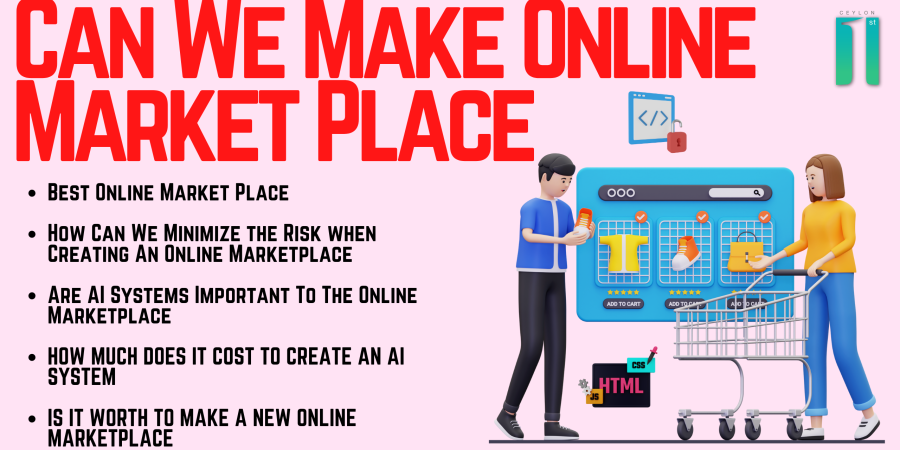Yes, it is possible to create an online marketplace. However, it is important to note that creating a successful online marketplace requires a significant amount of planning, development, and marketing.
Here are some general steps you can take to create an online marketplace:
- Choose your niche: Identify a specific market or niche that your online marketplace will serve.
- Define your business model: Determine how you will generate revenue, such as through commissions or subscription fees.
- Build your platform: Develop a user-friendly platform that allows sellers to list their products and buyers to make purchases.
- Attract sellers: Encourage sellers to join your platform by offering incentives, such as lower fees or access to a large customer base.
- Attract buyers: Market your platform to potential buyers through targeted advertising and social media.
- Provide support: Offer customer support and resolution services to ensure a positive experience for both buyers and sellers.
Keep in mind that creating an online marketplace can be a complex and challenging process. It is important to do your research and seek expert advice to increase your chances of success.
Best Online Market Place
There are several popular online marketplaces, each with its own unique features and advantages.
Here are a few of the best online marketplaces:
- Amazon: Amazon is the largest online marketplace in the world, offering a vast selection of products in a variety of categories, from books to electronics to clothing.
- eBay: eBay is one of the oldest and most well-known online marketplaces, known for its auction-style selling and buyer protections.
- Etsy: Etsy is a popular marketplace for handmade, vintage, and unique items. It’s a great place to find one-of-a-kind products from independent sellers.
- Walmart: Walmart is a retail giant that also offers an online marketplace where customers can buy products from a variety of sellers.
- Shopify: Shopify is a platform that allows small businesses to create their own online stores, making it a great option for entrepreneurs and independent sellers.
Ultimately, the best online marketplace for you will depend on your specific needs and preferences.
How Much Budget We Need
The budget required to create an online marketplace can vary widely depending on several factors such as the complexity of the platform, features you want to implement, marketing expenses, and other operational costs.
Here are some general expenses you may need to consider when creating an online marketplace:
- Development Costs: The cost of designing and developing your platform can vary depending on the scope of the project, technology used, and development team’s expertise. The development cost can range from a few thousand dollars to several hundred thousand dollars.
- Hosting and Infrastructure Costs: You will need to host your platform on a server and ensure that it has enough capacity to handle traffic. The cost of hosting and infrastructure can range from a few hundred dollars to several thousand dollars per month.
- Marketing Costs: Marketing is essential to attract buyers and sellers to your platform. You may need to invest in advertising, search engine optimization (SEO), and social media campaigns to reach your target audience. The marketing cost can range from a few hundred dollars to several thousand dollars per month.
- Operational Costs: You may need to hire a team to manage customer support, handle payments, and maintain the platform. The operational costs can range from a few thousand dollars to tens of thousands of dollars per month.
Overall, the budget required to create an online marketplace can range from tens of thousands of dollars to several hundred thousand dollars or more. It’s important to plan your budget carefully and be prepared for unexpected expenses.
What Was The Risk
Creating an online marketplace can involve several risks, including:
- Market Risk: There may not be enough demand for your marketplace or the niche you’re targeting, making it challenging to attract buyers and sellers.
- Technology Risk: Developing a complex platform can be challenging, and there may be technical issues that can affect the user experience or cause downtime.
- Security Risk: Online marketplaces deal with sensitive information, such as customer and seller data and payment information. It is essential to ensure the platform is secure and has proper measures in place to prevent data breaches and fraud.
- Financial Risk: Creating an online marketplace involves significant investment, and there is no guarantee that the marketplace will be profitable. It’s important to manage finances carefully and plan for unforeseen expenses.
- Legal and Regulatory Risk: Online marketplaces must comply with local and international regulations, including consumer protection laws, data privacy regulations, and tax laws. Failure to comply with these regulations can result in legal and financial penalties.
It’s important to understand these risks and have a plan to manage them before starting an online marketplace. Conducting thorough research, seeking expert advice, and having a solid business plan in place can help mitigate these risks and increase the chances of success.
How Can We Minimise Risk Of Creating An Online Marketplace
While creating an online marketplace involves inherent risks, there are several steps you can take to minimise these risks:
- Conduct thorough research: Before creating an online marketplace, research your market and target audience to ensure there is enough demand for your platform. Research your competitors to identify opportunities and areas where you can differentiate your platform.
- Develop a solid business plan: Create a detailed business plan that includes a description of your business, financial projections, marketing strategy, and risk management plan.
- Choose the right technology and development team: Select a reliable technology stack and experienced development team to ensure your platform is secure, user-friendly, and scalable.
- Implement proper security measures: Ensure your platform has proper security measures in place to protect customer data and prevent fraud. This includes using secure payment gateways, implementing SSL certificates, and complying with data privacy regulations.
- Manage finances carefully: Develop a financial plan and track your expenses carefully to avoid overspending or running out of funds. Consider seeking funding from investors or applying for loans to manage cash flow.
- Comply with legal and regulatory requirements: Ensure your platform complies with all relevant local and international regulations, including consumer protection laws, tax laws, and data privacy regulations.
By following these steps, you can minimize the risks associated with creating an online marketplace and increase your chances of success. It’s important to seek expert advice and stay up-to-date on best practices to ensure your platform remains secure and compliant with evolving regulations.
Witch Area We Need To Look More
Creating an online marketplace involves several areas that you need to focus on.
Here are some of the key areas to pay attention to:
- Target Audience: Understanding your target audience is crucial to the success of your online marketplace. Research your potential customers to identify their needs and preferences, and design your platform to meet their requirements.
- User Experience: A user-friendly platform is essential to attract and retain customers. Invest in developing a simple, intuitive, and visually appealing user interface that makes it easy for users to navigate and find what they are looking for.
- Technology: Choose the right technology stack to ensure your platform is reliable, secure, and scalable. Consider using cloud-based solutions to reduce infrastructure costs and improve flexibility.
- Payment Processing: Implement a secure and reliable payment processing system that supports multiple payment options and currencies to ensure a smooth and convenient transaction process for both buyers and sellers.
- Marketing: Develop a marketing strategy that helps you reach your target audience and build brand awareness. Use a mix of digital marketing channels such as social media, email marketing, and search engine optimization (SEO) to drive traffic to your platform.
- Customer Support: Offer excellent customer support to build trust and loyalty with your users. Provide multiple support channels such as phone, email, and live chat to ensure users can reach you easily.
- Compliance: Ensure your platform complies with relevant legal and regulatory requirements such as consumer protection laws, data privacy regulations, and tax laws to avoid legal and financial penalties.
By focusing on these key areas, you can create a successful online marketplace that meets the needs of your target audience and provides a positive user experience.
Dose It AI System Is Important To The Online Marketplace
Artificial Intelligence (AI) systems can be crucial for online marketplaces, as they can help improve the user experience and increase efficiency.
Here are some ways AI can benefit an online marketplace:
- Personalization: AI can help personalize the user experience by analyzing user data and providing relevant product recommendations, search results, and content.
- Predictive Analytics: AI can analyze user data and provide predictive insights, such as identifying trends and patterns in user behavior, and predicting future demand.
- Fraud Detection: AI can be used to detect fraudulent activity such as fake reviews, fake sellers, and suspicious transactions, which helps ensure a secure and trustworthy platform.
- Chatbots: AI-powered chatbots can be used to provide quick and efficient customer support, answering frequently asked questions and resolving issues 24/7.
- Supply Chain Optimization: AI can help optimize the supply chain by providing insights into inventory management, demand forecasting, and logistics optimization.
Overall, AI can provide significant benefits to an online marketplace, including increased efficiency, improved customer experience, and enhanced security. However, it’s important to ensure that the AI system is ethical, transparent, and complies with relevant regulations. Additionally, proper training and testing of the AI system are essential to ensure its accuracy and reliability.
How Much Dose It Cost AI System
The cost of implementing an AI system for an online marketplace can vary widely depending on the specific use case and the complexity of the system.
Here are some factors that can influence the cost:
- Development: The cost of developing an AI system can depend on the complexity of the system, the number of features, and the time required for development. This can range from tens of thousands to millions of dollars.
- Data Collection: The cost of collecting and processing data can vary depending on the volume and quality of the data, as well as the data sources. This can involve hiring data scientists or purchasing data from third-party providers.
- Infrastructure: The cost of infrastructure includes the hardware and software required to run the AI system, such as servers, storage, and cloud computing services.
- Maintenance: Ongoing maintenance and support costs can include updates, bug fixes, and training, as well as costs associated with ensuring the AI system remains accurate, reliable, and secure.
Overall, the cost of implementing an AI system for an online marketplace can be significant. However, the benefits of AI, such as improved efficiency, enhanced customer experience, and increased revenue, can outweigh the costs in the long run. It’s important to conduct a thorough cost-benefit analysis before implementing an AI system to ensure it aligns with your business goals and budget.
Is It Worth IT?
Whether implementing an AI system for an online marketplace is worth it depends on several factors such as the specific use case, the size and complexity of your marketplace, your budget, and your business goals.
Here are some potential benefits of implementing an AI system for an online marketplace that can make it worth the investment:
- Increased Efficiency: AI can automate repetitive tasks, such as inventory management and customer support, freeing up time and resources for other business activities.
- Improved Customer Experience: AI can provide personalized recommendations and insights that can enhance the user experience and increase customer satisfaction.
- Cost Savings: AI can help reduce costs associated with manual processes, such as data entry and analysis, and improve supply chain efficiency, leading to cost savings in the long run.
- Competitive Advantage: Implementing an AI system can give your marketplace a competitive advantage by providing unique features and capabilities that differentiate it from competitors.
- Scalability: AI systems can be designed to scale as your marketplace grows, making it easier to handle an increasing number of users and transactions.
Overall, the potential benefits of implementing an AI system can make it worth the investment, but it’s important to conduct a thorough cost-benefit analysis to determine whether it aligns with your business goals and budget. Additionally, proper planning and implementation are crucial to ensure the AI system meets your specific needs and delivers the expected benefits.
If We Implant Online Marketplace Now How Long Do We Have To Wait Of The Out Come
The timeframe for outcomes of an online marketplace can vary depending on various factors such as the size of the marketplace, the type of products or services offered, the target audience, the marketing strategy, and the competition.
Here are some general factors that can affect the timeline:
- Marketplace Development: Developing a marketplace can take time, ranging from a few months to a year or more depending on the complexity of the features and the customization required.
- User Acquisition: Acquiring a critical mass of users can take time and effort. It may involve marketing campaigns, advertising, and social media outreach, which can take several months to a year or more to build a significant user base.
- Revenue Generation: Generating revenue from an online marketplace can take time, especially if the marketplace requires a significant number of users or transactions before becoming profitable. It may take a few months to a year or more to reach the desired revenue targets.
- Competition: The level of competition in the industry can affect the timeline for outcomes. If there are already established competitors, it may take longer to acquire users and generate revenue.
Overall, it’s important to have realistic expectations and a long-term perspective when it comes to an online marketplace’s outcomes. While some marketplaces may achieve success quickly, others may take longer to reach their goals. Patience, persistence, and continuous improvement are essential to the success of an online marketplace.
Dose It Worth It Make New Online Marketplace
Deciding whether it’s worth it to create a new online marketplace depends on several factors such as market demand, competition, the uniqueness of the products or services, and the feasibility of the project.
Here are some factors to consider when evaluating the potential value of creating a new online marketplace:
- Market Demand: Is there a demand for the products or services you plan to offer on the marketplace? Conducting market research and analyzing industry trends can help you determine whether there is a viable market for your proposed marketplace.
- Competition: Are there already established marketplaces that offer similar products or services? If so, what sets your marketplace apart and how will you differentiate yourself from competitors?
- Uniqueness: Does your marketplace offer unique products or services that are not available on other marketplaces? Having a unique value proposition can help your marketplace stand out and attract users.
- Feasibility: Is it technically feasible to create the marketplace? What resources and expertise do you need to develop and maintain the platform, and how much will it cost?
- Revenue Potential: What is the revenue potential of the marketplace? Can you generate sufficient revenue to cover development and operating costs, and achieve a profitable return on investment?
Overall, creating a new online marketplace can be worth it if there is a demand for the products or services, a unique value proposition, and a feasible plan for development and revenue generation. Conducting thorough research, developing a sound business plan, and implementing effective marketing strategies are key to increasing the chances of success.
CEYLON FIRST



Leave feedback about this